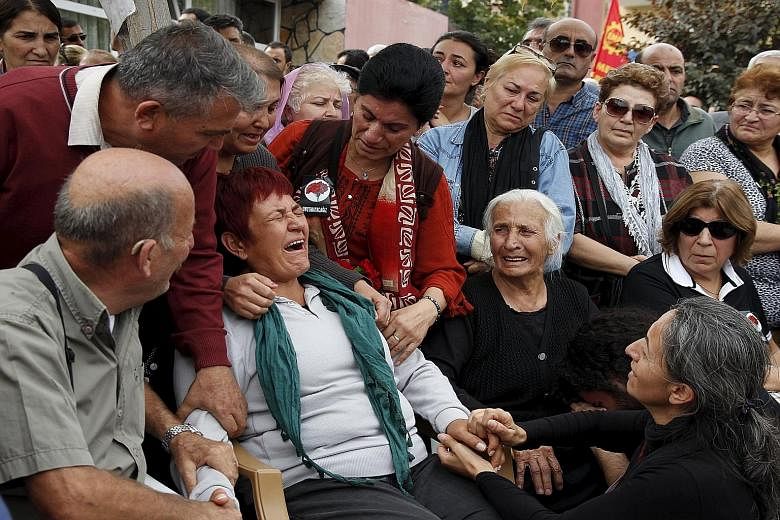ANKARA • They came from all over Turkey to recover on Sunday what remained of their loved ones. Gathered inside a morgue in Ankara, the families of the victims of the suspected double suicide bombing attack last Saturday struggled to come to terms with their loss and the manner in which it happened.
The government estimates that 97 people were killed in the attack targeting a major peace rally planned for Saturday. It had attracted activists from all over the country. The gathering never took place.
The families waited, sheltered by tent coverings from a light rain, seated on carpets. Hundreds of men and women of all ages in tears waited for whatever remains of their loved ones would be given back to them.
When the vehicles carrying the coffins approached, the crowd applauded, but timidly. Some started to ululate but stopped short. "This is not really a place for flags or slogans," said a young woman, 23, who asked to remain anonymous.
Her eyes filled with tears and she expressed bewilderment that the attack had taken place in the heart of the Turkish capital, which had never before seen violence on anything like this scale. "In the south-east of Turkey we are used to deaths, to martyrs, but not here," she said. "This time, almost 100 people were killed right in the middle of the capital city. You understand this?"
The activists who had come to attend the rally in Ankara last Saturday were from different groups - some labour, some leftist, some Kurdish. But all wanted to promote peace, under the banner "labour, peace, democracy".
"Everyone came here to defend peace," said Umit, his voice quivering after his sister died in the attack. He complained that given the relatives' agony, the process of reclaiming the corpses had been too slow. "We have not been able to recover the bodies!" he said.
Safiye, in his 50s, said he is still haunted by the sheer horror of the moment of the twin blasts.
"I saw arms flying above my head, in front of me and behind me. There were corpses, corpses everywhere," he said.
For Mahomet, it was simply "the apocalypse". The young man recounted with a calm detachment the horror he had seen.
"Someone lost their arm. Someone lost their foot and others were simply bathing in their blood," he said. "It was worse than war. It's possible to escape war. Here you could not, it was inhuman."
AGENCE FRANCE-PRESSE

